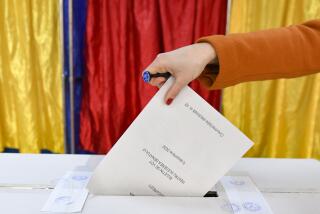Iraqis See Role for Islam in Government
- Share via
WASHINGTON — Iraqis are divided over what political framework they want for their new government, but a majority want Islam to play some role in it, according to a new survey in Iraq by the State Department’s Office of Research.
“The public divides among those who support a democracy based on human rights, those who support an Islamic state based on Sharia law, and those who support a mix,” the authors of the survey wrote in a report released Saturday on the Web site of the Coalition Provisional Authority, the U.S.-led occupation administration in Iraq.
Although many respondents believe that Islam has a role in government, the authors noted that “support for religious figures in government does not necessarily preclude support for leadership accountability ... through such mechanisms as elections and free speech.”
When broken down by geographic areas, the poll reinforces well-known differences among ethnic Kurds in the north, Arab Sunni Muslims in central Iraq and the majority Arab Shiite Muslims, who dominate the south. The survey was based on 1,444 interviews in seven urban areas and had a margin of error of 3.4 percentage points.
In the Kurdish north, a Western-style democracy or a mix with Islam is overwhelmingly favored.
In the southern cities of Basra and Najaf, almost two-thirds of those polled consider it important that religious leaders play a large role in politics and an Islamic state is far more popular.
Even in Baghdad, almost 60% of respondents deem it important that religious leaders play a major role in government and more than half of them consider it “very important.”
The capital is almost evenly divided with about one-third favoring a Western democracy, another third a mix of democracy and Islam and the final third wanting an Islamic state with Sharia, the religious law, as part of government.
The poll results showing that a majority of Iraqis want a role for religion in their government appear to run counter to what Bush administration leaders expected. Last month, Vice President Dick Cheney referred to a Zogby International poll that he said showed overwhelming opposition to an Islamic government in Iraq.
“If you want to ask them do they want an Islamic government established, by 2-to-1 margins they say no, including the Shiite population,” Cheney said on NBC’s “Meet the Press.”
Another poll conducted in Iraq recently also shows strong support for a role for religion in government. The survey by Iraq’s Center for Research and Strategic Studies, a think tank set up by a group of Iraqi professors after Saddam Hussein’s fall, found that 33.7% of respondents wanted an “Islamic theocracy” while 23.7% said they backed “Islamic democracy.” Support for “democracy” was at 30.5%. The terms were undefined.
The think tank’s poll results, released last week, also showed that 67% of Iraqis saw the U.S.-led coalition forces as “occupying powers.” That is up from 46% in a survey conducted shortly after the war that ousted Hussein.
Fifteen percent considered the U.S.-led coalition forces “liberating forces,” down from 43% six months ago. One in 10 saw them as peacekeepers, twice as many as in April.
The think tank’s poll of 1,620 Iraqis was conducted in seven cities from Sept. 28 to Oct. 10 and had a margin of error of 3 percentage points.
More to Read
Sign up for Essential California
The most important California stories and recommendations in your inbox every morning.
You may occasionally receive promotional content from the Los Angeles Times.








